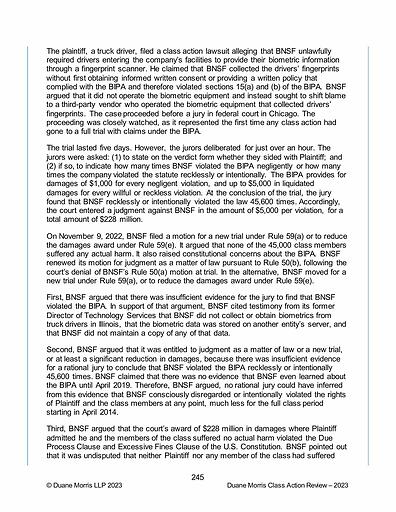Duane Morris Class Action Review - 2023 - Report - Page 246

The plaintiff, a truck driver, filed a class action lawsuit alleging that BNSF unlawfully
required drivers entering the company’s facilities to provide their biometric information
through a fingerprint scanner. He claimed that BNSF collected the drivers’ fingerprints
without first obtaining informed written consent or providing a written policy that
complied with the BIPA and therefore violated sections 15(a) and (b) of the BIPA. BNSF
argued that it did not operate the biometric equipment and instead sought to shift blame
to a third-party vendor who operated the biometric equipment that collected drivers’
fingerprints. The case proceeded before a jury in federal court in Chicago. The
proceeding was closely watched, as it represented the first time any class action had
gone to a full trial with claims under the BIPA.
The trial lasted five days. However, the jurors deliberated for just over an hour. The
jurors were asked: (1) to state on the verdict form whether they sided with Plaintiff; and
(2) if so, to indicate how many times BNSF violated the BIPA negligently or how many
times the company violated the statute recklessly or intentionally. The BIPA provides for
damages of $1,000 for every negligent violation, and up to $5,000 in liquidated
damages for every willful or reckless violation. At the conclusion of the trial, the jury
found that BNSF recklessly or intentionally violated the law 45,600 times. Accordingly,
the court entered a judgment against BNSF in the amount of $5,000 per violation, for a
total amount of $228 million.
On November 9, 2022, BNSF filed a motion for a new trial under Rule 59(a) or to reduce
the damages award under Rule 59(e). It argued that none of the 45,000 class members
suffered any actual harm. It also raised constitutional concerns about the BIPA. BNSF
renewed its motion for judgment as a matter of law pursuant to Rule 50(b), following the
court’s denial of BNSF’s Rule 50(a) motion at trial. In the alternative, BNSF moved for a
new trial under Rule 59(a), or to reduce the damages award under Rule 59(e).
First, BNSF argued that there was insufficient evidence for the jury to find that BNSF
violated the BIPA. In support of that argument, BNSF cited testimony from its former
Director of Technology Services that BNSF did not collect or obtain biometrics from
truck drivers in Illinois, that the biometric data was stored on another entity’s server, and
that BNSF did not maintain a copy of any of that data.
Second, BNSF argued that it was entitled to judgment as a matter of law or a new trial,
or at least a significant reduction in damages, because there was insufficient evidence
for a rational jury to conclude that BNSF violated the BIPA recklessly or intentionally
45,600 times. BNSF claimed that there was no evidence that BNSF even learned about
the BIPA until April 2019. Therefore, BNSF argued, no rational jury could have inferred
from this evidence that BNSF consciously disregarded or intentionally violated the rights
of Plaintiff and the class members at any point, much less for the full class period
starting in April 2014.
Third, BNSF argued that the court’s award of $228 million in damages where Plaintiff
admitted he and the members of the class suffered no actual harm violated the Due
Process Clause and Excessive Fines Clause of the U.S. Constitution. BNSF pointed out
that it was undisputed that neither Plaintiff nor any member of the class had suffered
245
© Duane Morris LLP 2023
Duane Morris Class Action Review – 2023













